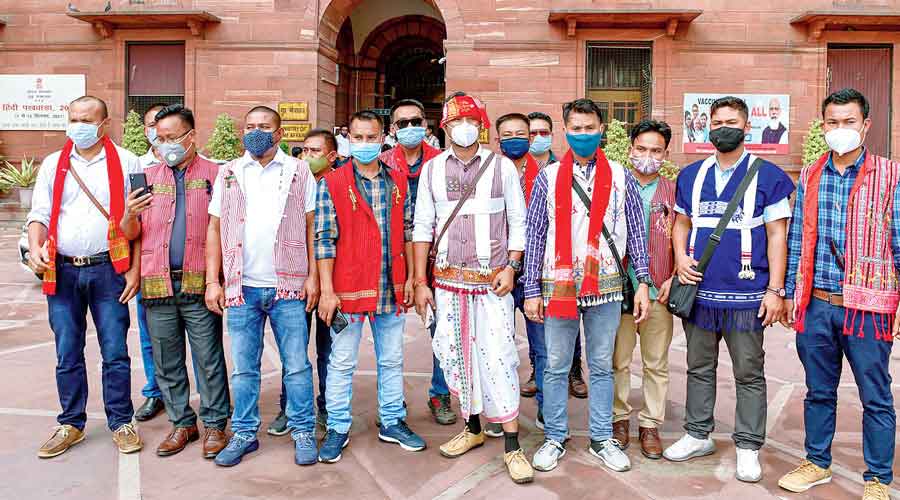The Centre on Saturday signed a tripartite peace accord with Karbi insurgent outfits that is expected to end protracted violence in the Karbi Anglong region of Assam.
The Karbi Peace Accord was signed in New Delhi in the presence of Union home minister Amit Shah, Assam chief minister Himanta Biswa Sarma and representatives of some Karbi insurgent groups from the Karbi Anglong Autonomous Council that governs the Karbi Anglong district.
The Karbis, who have been fighting for statehood, are a major ethnic community of Assam and have several factions and splinter groups. The history of the Karbi insurgent groups has been marked by killings, ethnic violence and abductions since the late 1980s.
A media statement from the Union home ministry said the agreement would ensure greater devolution of autonomy to the Karbi Anglong Autonomous Council (KAAC), protection of the identity, language and culture of the Karbi people and focused development of the council area without affecting the territorial and administrative integrity of Assam.
“The Karbi armed groups have agreed to abjure violence and join the peaceful democratic process as established by law of the land. The agreement also provides for rehabilitation of cadres of the armed groups,” the statement said.
Shah said a Rs 1,000-crore development package would be given to Karbi Anglong. “I want to assure everyone that we will implement this accord in a time-bound manner,” the Union home minister said.
The Assam government, the home ministry statement said, will also set up a Karbi Welfare Council for the development of Karbis living outside the KAAC area.
“The Consolidated Fund of the State will be augmented to supplement the resources of the KAAC. Overall, the present settlement proposes to give more legislative, executive, administrative and financial powers to the KAAC,” the statement said.
Besides the Centre and the Assam government, the signatories to the accord are Tuliram Ronghang, chief executive member of the KAAC, and representatives of the Karbi Longri North Cachar Hills Liberation Front, People’s Democratic Council of Karbi Longri, United People’s Liberation Army and the Karbi People’s Liberation Tigers factions.
In February, 1,040 Karbi militants belonging to these outfits had laid down arms before then Assam chief minister Sarbananda Sonowal to return to the mainstream.
The KAAC is one of the three autonomous councils in Assam under the Sixth Schedule that provides for protection of the rights of tribals. The other two are the Bodoland Territorial Council and the North Cachar Hills Autonomous Council.
The Naga Students’ Federation and the NSCN (I-M) had earlier expressed reservations about the proposed tripartite pact. The NSF had claimed that the Naga populace of Karbi Anglong district, who the outfit says are the original inhabitants of the area, had not been consulted. The NSCN (I-M) had said the proposed Karbi Anglong Autonomous Territorial Council should not “override” the interests of the Rengma Nagas living there.
The NSCN (I-M) had said the “present Karbi Anglong areas” were officially declared Rengma Naga Hills in 1841 during British rule.
“The Karbis who are immigrants from different places like Sivasagar, Nagaon, Cachar, Tezpur, Lakhimpur, Silchar and Khasi and Jaintia Hills during British rule cannot claim (for) themselves the status of original inhabitants,” an NSCN (I-M) statement had said.
The outfit had also declared that any pact that “victimises” the Rengma Nagas, according to it the legitimate owners of the land, would not be acceptable to the Nagas in general and to the NSCN (I-M) in particular.











